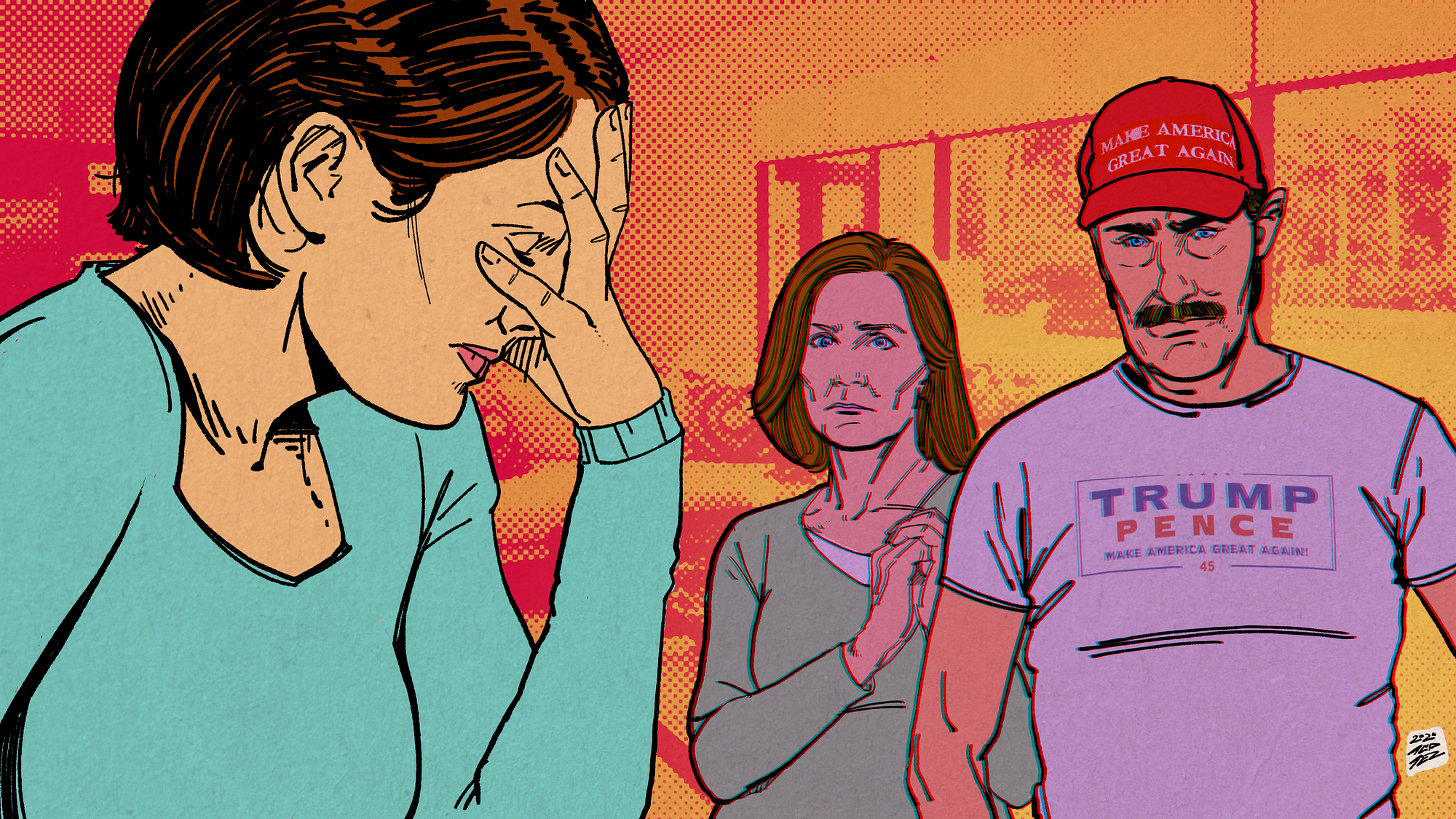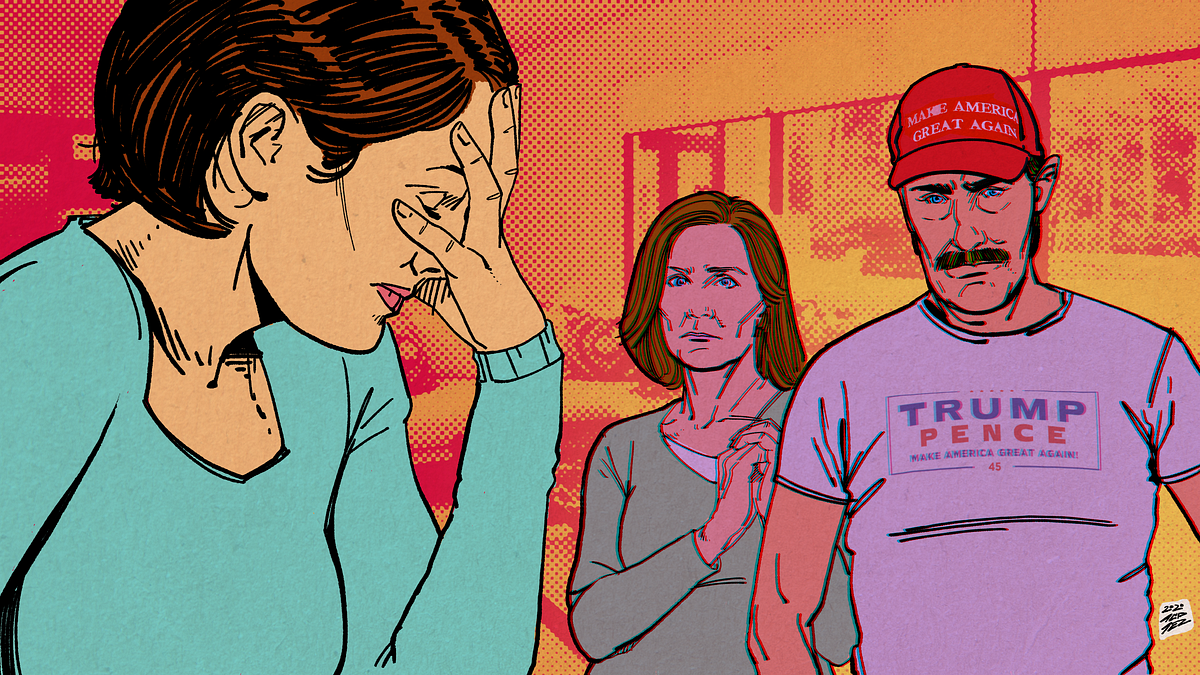
It’s challenging to begin this piece without bashing conservatives in a brazen anecdote that references Fox News — but I’ll refrain for now, because the conservatives I’m talking about are my parents.
In my family of six, it’s just my sister and I seated at the liberal end of the table. I wish it was different. I wish we could talk about politics at family gatherings, commiserating in disgust at the latest scum to come from Trump’s Twitter account or making fun of the fly that landed on Mike Pence’s head in that debate (a conversation topic that could surely last an entire meal).
Sign up for The Bold Italic newsletter to get the best of the Bay Area in your inbox every week.
Instead, dinners have resulted in the scattering and yelling of siblings and parents when we’ve broached the topic, with tears and disgust from both sides. Because of these blowups in which my sister and I are against everyone else, we’ve implemented a No-Political-Conversations-at-Dinner boundary. Closely following this rule was the Political-Meme-On-Instagram-Ban of 2016 in which my father officially became banned from sending my sister and me political memes on social media.
When my racist, gay-loathing uncle started to venture into the political conversation territory at a recent family gathering, my sister and I reminded him of the boundary. “You need to hear this!” He whined while we walked away, an image that I can’t rid from my brain — a white man trying to cram hate down my throat while I set a boundary.
It shocked me. Shook me. That the country had voted this way. It killed me that I was related to some of these people.
When Trump won the 2016 election I sat on my couch with everyone else in my liberal, Bay Area bubble and watched in horror as the night progressed. Drank a bottle of wine. Cried. Went to bed with all the hope I had snuffed out like a flame. The streets of San Francisco were somber the next day — everyone walked into the office late. Defeated. It shocked me. Shook me. That the country had voted this way. It killed me that I was related to some of these people.
The stakes are even higher this time.
I’m terrified of the ways the upcoming election and its results will drive a bigger wedge between my parents and me. I truthfully don’t know how to approach it — it feels like an impossible task.
There are great resources out there about how to talk to your family about race, about politics, and while those do an incredible job at diving into the tactics of this process,they don’t address the emotional murk of coping with accepting that your parents hold these beliefs. And the fact that sometimes, as much as you try, you can’t change them. Sifting through the existential questions of how this could be possible, how can you accept that the people you love hold beliefs that you think are rooted in hate?
And perhaps my parents wonder too — how can I be their daughter with these beliefs, liberal and queer and so far on the other side from them?
I can count on one hand the number of friends I have whose parents are also conservative. At a recent friend gathering, we were discussing the upcoming election. A few people casually mentioned their parent’s progressive beliefs, or the conversations they have on Zoom with their families, and how outraged they all are about the election. The undertone to these stories is a bonding, a deep understanding, a camaraderie of kin about something so important it has the power to shape lives in our country, to cause deaths, and have a severe negative impact on others and their fundamental rights.
I’ve felt envious as I imagined being on the same side as my family. I voiced this to the group — a confession paired with white-hot shame settling on my face, like a secret, like a small death, like the dirtiest word, “My parents are conservative.”
And maybe I imagined it — the small shift in their facial expressions that revealed pity, the speculation that if my parents supported a racist, misogynistic human as president of the United States, I must have some of that within me too.
To have such strikingly different views from them is a sort of identity crisis. A loss of understanding in a deep familial intimacy.
One person chimed in to share that they had a conservative cousin, and then another person shared that their uncle was, too. “It looks like we all have conservative family members,” she said.
But simply being related to these people is not the same as having the conservatives in question being the ones who raised you, who laid the foundation of your morals and values since birth. To have such strikingly different views from them is a sort of identity crisis. A loss of understanding in a deep familial intimacy.
As shelter-in-place began, and months of quarantine persisted, I found myself avoiding my parents, and noticed them avoiding me. My dad ignored my calls and text messages. Covid-19 shouldn’t be political, but it was. It is. Wearing masks has been viewed by many as a political matter rather than a public safety one.
I avoided going home to see my parents because of it. Not because I don’t love them, but given the Covid landscape,I feared the increased probability of political conversations and I didn’t trust myself, couldn’t trust myself, to abide by the “no political conversations” boundary. I didn’t see how it could be avoided.
Eventually, I planned a trip home this summer to see my parents, realizing that the closer we get to the election, the more challenging it would be to see them. I was nervous. Could we avoid talking about politics? Could we have a good time without acknowledging the massive opposition of our political beliefs? Could I stay curious in conversation with them about it?
While home, my dad and I went out for a beer. As we waited outside in a socially distanced line I found myself amused at our masks. Mine had artsy boobs illustrated on it, my dad’s donned the text: “This mask is as useless as our governor.” We were wearing our political views on our masks.
I tried to harness compassion and considered why my dad might have the political views he did. I considered why I did. I considered why we weren’t able to stay close to hear each other’s views. I considered how we were both the most stubborn people I have ever known. I considered what was important to him. I considered what was important to me. I considered where he got his news.
When I’ve tried to have those hard conversations about race and Trump and Black Lives Matter and Covid and fundamental rights, attempting to delicately broach the topic, it has failed. I have attempted to do so from a personal angle, sure that that wasmy way in. I’ve come out to my family recently, and if they loved and supported me like they say they do, I hoped they’d finally see my point of view. That they wouldn’t vote for Trump.
But the response is heartbreaking. I’m sure that I’m right, that my views result in overall less suffering for Americans, something I care deeply about. They are sure that they are right.The only common ground is the love we have for each other. And that is not a small thing.
I am fortunate to have been raised by parents who care deeply about my well-being and have always invested in my success. My dad took us camping almost every weekend. My mom never failed to make cupcakes for our classes as a child, volunteer for field trips, or drive across town to pick us up from three different schools. My parents welcomed my first girlfriend home for the holidays without question. I am lucky, I realize, to have their generosity and care, even if we didn’t have much growing up. And I understand. I have been witness to their own suffering and hardships and I would never cut them out of my life — their love for my siblings and me is unconditional and rare. This is what I focus on.
But, if Trump wins the election, I don’t know if I can go home for Christmas this year.







